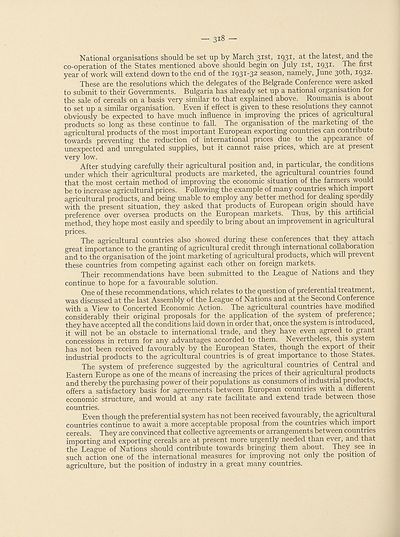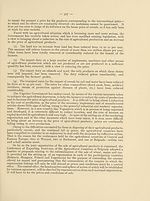Download files
Complete book:
Individual page:
Thumbnail gallery: Grid view | List view

- 318 -
National organisations should be set up by March 3Ist> TQS1* la^es^-> an(^
co-operation of the States mentioned above should begin on July ist, I931- The first
year of work will extend down to the end of the 1931-32 season, namely, June 30th, 1932.
These are the resolutions which the delegates of the Belgrade Conference were asked
to submit to their Governments. Bulgaria has already set up a national organisation for
the sale of cereals on a basis very similar to that explained above. Roumania is about
to set up a similar organisation. Even if effect is given to these resolutions they cannot
obviously be expected to have much influence in improving the prices of agricultural
products so long as these continue to fall. The organisation of the marketing of the
agricultural products of the most important European exporting countries can contribute
towards preventing the reduction of international prices due to the appeal ance of
unexpected and unregulated supplies, but it cannot raise prices, which are at present
very low.
After studying carefully their agricultural position and, in particular, the conditions
under which their agricultural products are marketed, the agricultural countries found
that the most certain method of improving the economic situation of the farmers would
be to increase agricultural prices. Following the example of many countries which import
agricultural products, and being unable to employ any better method for dealing speedily
with the present situation, they asked that products of European origin should have
preference over oversea products on the European markets. Thus, by this artificial
method, they hope most easily and speedily to bring about an improvement in agricultural
prices.
The agricultural countries also showed during these conferences that they attach
great importance to the granting of agricultural credit through international collaboration
and to the organisation of the joint marketing of agricultural products, which will prevent
these countries from competing against each other on foreign markets.
Their recommendations have been submitted to the League of Nations and they
continue to hope for a favourable solution.
One of these recommendations, which relates to the question of preferential treatment,
was discussed at the last Assembly of the League of Nations and at the Second Conference
with a View to Concerted Economic Action. The agricultural countries have modified
considerably their original proposals for the application of the system of preference;
they have accepted all the conditions laid down in order that, once the system is introduced,
it will not be an obstacle to international trade, and they have even agreed to grant
concessions in return for any advantages accorded to them. Nevertheless, this system
has not been received favourably by the European States, though the export of their
industrial products to the agricultural countries is of great importance to those States.
The system of preference suggested by the agricultural countries of Central and
Eastern Europe as one of the means of increasing the prices of their agricultural products
and therebv the purchasing power of their populations as consumers of industrial products,
offers a satisfactory basis for agreements between European countries with a different
economic structure, and would at any rate facilitate and extend trade between those
countries.
Even though the preferential system has not been received favourably, the agricultural
countries continue to await a more acceptable proposal from the countries which import
cereals. They are convinced that collective agreements or arrangements between countries
importing and exporting cereals are at present more urgently needed than ever, and that
the League of Nations should contribute towards bringing them about. They see in
such action one of the international measures for improving not only the position of
agriculture, but the position of industry in a great many countries.
National organisations should be set up by March 3Ist> TQS1* la^es^-> an(^
co-operation of the States mentioned above should begin on July ist, I931- The first
year of work will extend down to the end of the 1931-32 season, namely, June 30th, 1932.
These are the resolutions which the delegates of the Belgrade Conference were asked
to submit to their Governments. Bulgaria has already set up a national organisation for
the sale of cereals on a basis very similar to that explained above. Roumania is about
to set up a similar organisation. Even if effect is given to these resolutions they cannot
obviously be expected to have much influence in improving the prices of agricultural
products so long as these continue to fall. The organisation of the marketing of the
agricultural products of the most important European exporting countries can contribute
towards preventing the reduction of international prices due to the appeal ance of
unexpected and unregulated supplies, but it cannot raise prices, which are at present
very low.
After studying carefully their agricultural position and, in particular, the conditions
under which their agricultural products are marketed, the agricultural countries found
that the most certain method of improving the economic situation of the farmers would
be to increase agricultural prices. Following the example of many countries which import
agricultural products, and being unable to employ any better method for dealing speedily
with the present situation, they asked that products of European origin should have
preference over oversea products on the European markets. Thus, by this artificial
method, they hope most easily and speedily to bring about an improvement in agricultural
prices.
The agricultural countries also showed during these conferences that they attach
great importance to the granting of agricultural credit through international collaboration
and to the organisation of the joint marketing of agricultural products, which will prevent
these countries from competing against each other on foreign markets.
Their recommendations have been submitted to the League of Nations and they
continue to hope for a favourable solution.
One of these recommendations, which relates to the question of preferential treatment,
was discussed at the last Assembly of the League of Nations and at the Second Conference
with a View to Concerted Economic Action. The agricultural countries have modified
considerably their original proposals for the application of the system of preference;
they have accepted all the conditions laid down in order that, once the system is introduced,
it will not be an obstacle to international trade, and they have even agreed to grant
concessions in return for any advantages accorded to them. Nevertheless, this system
has not been received favourably by the European States, though the export of their
industrial products to the agricultural countries is of great importance to those States.
The system of preference suggested by the agricultural countries of Central and
Eastern Europe as one of the means of increasing the prices of their agricultural products
and therebv the purchasing power of their populations as consumers of industrial products,
offers a satisfactory basis for agreements between European countries with a different
economic structure, and would at any rate facilitate and extend trade between those
countries.
Even though the preferential system has not been received favourably, the agricultural
countries continue to await a more acceptable proposal from the countries which import
cereals. They are convinced that collective agreements or arrangements between countries
importing and exporting cereals are at present more urgently needed than ever, and that
the League of Nations should contribute towards bringing them about. They see in
such action one of the international measures for improving not only the position of
agriculture, but the position of industry in a great many countries.
Set display mode to:
![]() Universal Viewer |
Universal Viewer | ![]() Mirador |
Large image | Transcription
Mirador |
Large image | Transcription
Images and transcriptions on this page, including medium image downloads, may be used under the Creative Commons Attribution 4.0 International Licence unless otherwise stated. ![]()
| League of Nations > Economic and financial section > Agricultural crisis > Volume 1 > (322) |
|---|
| Permanent URL | https://digital.nls.uk/190906836 |
|---|
| Shelfmark | LN.II.2/2.(35) |
|---|---|
| Attribution and copyright: |
|
| Shelfmark | LN.II.2/2.(35-35) |
|---|---|
| Shelfmark | LN.II |
|---|
| Description | Over 1,200 documents from the non-political organs of the League of Nations that dealt with health, disarmament, economic and financial matters for the duration of the League (1919-1945). Also online are statistical bulletins, essential facts, and an overview of the League by the first Secretary General, Sir Eric Drummond. These items are part of the Official Publications collection at the National Library of Scotland. |
|---|---|
| Additional NLS resources: |
|

